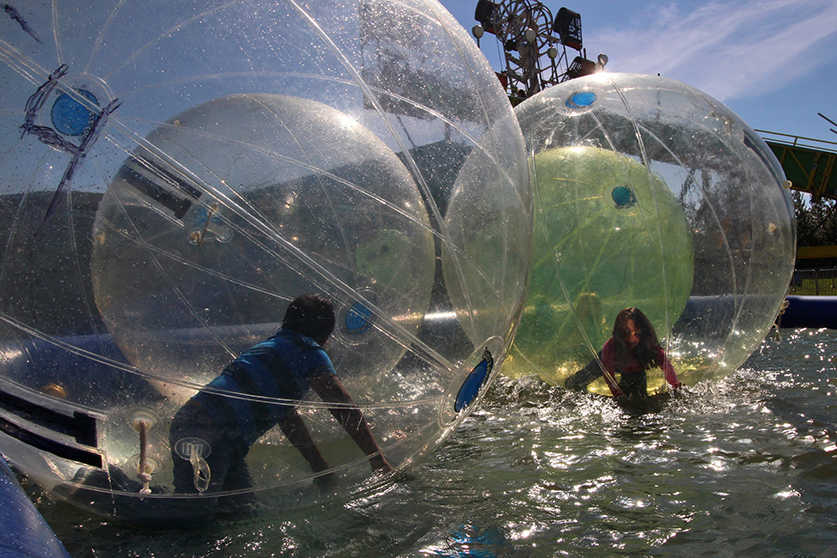The cycle of summer events on the Kenai Peninsula — from the Kenai River Fest to Fourth of July to Progress Days to Salmonfest — is winding down with last weekend’s Kenai Peninsula Fair in Ninilchik. Sunday was the fair’s last day of rodeo riding, pig racing, tilt-a-whirling, and other events.
On Saturday afternoon, the fairground’s northeastern corner was filled with quacking, clucking, and gobbling as Kenai Peninsula 4-Hers prepared birds they’d raised for a poultry auction.
Although 4-Her Melanie Carpenter has raised chickens before, her first turkey fetched a bid of $275 on Saturday. She cared for and fed the bird for four months after purchasing it as a chick from Cadre Feed in Soldotna.
“They require lots of care,” Carpenter said. “They require lots of food because they’re very big birds… For the first few weeks they’d wake us up in the middle of the night to be fed.”
In addition to turkey feed, Carpenter said her family’s turkeys eat “greens like dandelions, or any green thing laying around. They love shiny stuff, too.”
Calculating the amount of food to hit the weight required for exhibition at the fair is one of the challenges of raising show turkeys, Carpenter said — although for meat turkey, the weight doesn’t matter. The turkey she sold Saturday weighed 29 pounds.
Accustoming future show turkeys to human interaction is another job.
“Turkeys are really inquisitive and friendly if you raise them right,” Carpenter said. “If you give them attention when they’re babies, they’ll be sweet and love people. But you just ignore them unless you’re giving them food and water, then they’ll be skittish and won’t like you. We didn’t have that problem because we loved to play with them when they were little babies.”
Carpenter said the fair was “her favorite time of year, by far.” Her family stays in a trailer on the fairground.
“It’s like camping,” she said. “A lot of my friends are here because a lot of my friends are in 4-H.”
Carpenter said she may put her auction earnings toward the animal she really wants to raise — a pig — if her family can make space for it.
Elsewhere at the fair, volunteers from the Ninilchik School basketball team patrolled the grounds for garbage and emptied trash cans every few hours, according to basketball team member Robert McGinnis (also son of fair organizer Laura McGinnis).
The red recycling bins, to McGinnis’ chagrin, needed to be emptied far less frequently.
“We haven’t collected any recyclables yet, because (the recycling bins) haven’t filled up,” McGinnis said. “There’s not a lot of people who recycle at this event.”
McGinnis created a mobile recycling trailer as an entry in the 2015 Caring for the Kenai environmental project contest, which he’s used this summer and last to recycle aluminum and plastic waste from Salmonfest, the Kenai Peninsula Beer Festival in Soldotna, and the fair.
Although the amount of recyclables for him to carry away remains low, McGinnis said he has seen an increase in recycling during in his second year of collecting at the fair.
“Before we’d hardly get a bag of recyclables,” he said. “Now we’re getting maybe three or four bags of aluminum and plastic.”
Among the long rows of food vendor booths, other Ninilchik youth were making and serving frybread. The funds from the booth would be dedicated to “dances, camping, sports equipment, things like that — things to keep the kids busy,” said Zoe Dixon, a leader of the Resilient Alaska Youth program and one of the adult supervisors in the frybread booth.
Frybread is a traditional Alaskan Native food — sheets of fried dough with a sweet topping.
For those unfamiliar with it, Tiffany Stonecipher, another adult overseeing the booth, compares it to a more commonplace fair food.
“When you say it’s just like an elephant ear, people get it,” Stonecipher said. Most of Ninilchik’s long-time residents don’t need an explanation, though.
“(Frybread) is what a lot of people raised their families on,” said Stonecipher. “It’s more common for Ninilchik elders to talk about eating frybread than something like pancakes or waffles. This is very traditional for us here in Ninilchik.”
Ingredients for toppings — fruit jams and nasternum and fireweed honey — were harvested around Ninilchik.
“The strawberries were grown right across the street, up the hill (from the fairgrounds) by a local elder who has strawberry beds and let us come and gather them,” Stonecipher said.
Local teenagers worked the booth in rotating shifts, spending the time between wandering the fair. According to Dixon, they’ve had a busy summer.
“We have a big camping trip coming up, and we’ve done a lot of community service,” Dixon said. “We teamed up and helped some elders — stacking wood, picking rhubarb, helping take care of their garden. We built a whole community garden from scratch.”
For many, working in the booth is a final summer activity.
“School starts up next week, so this is going to be one of the last things the kids are involved with before that,” Dixon said.
Reach Ben Boettger at ben.boettger@peninsulaclarion.com.

